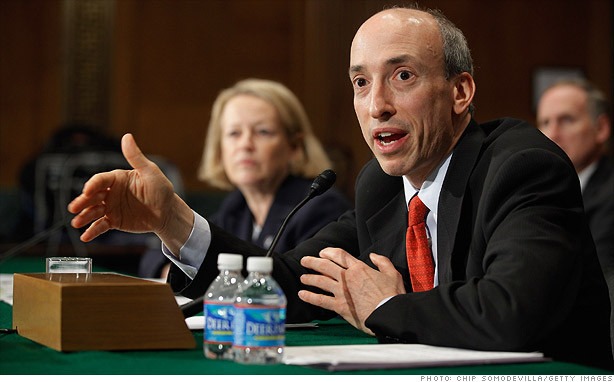(Gary Gensler | Source: Getty via CNN)
Remember credit-default swaps?
Naked credit-default swaps?
A $45 trillion credit-default swap market?
The market collapse of 2007?
The $45 trillion swaps market in 2007 was twice the size of the U.S. stock market ($22 trillion and plummeting at the time) and bigger than the U.S. mortgage market (then $7.1 trillion). The public (and a lot of burned investors) learned about credit-default swaps too late, after their unraveling sandbagged markets.
| Republicans lost on market regulation in 2010. Since then, they have been winning a guerrilla war they’re fighting on behalf of their Wall Street constituents. |
New York Insurance Department Supervisor Eric Dinallo explained credit default swaps at an appropriations hearing I attended in late 2008. He put swaps in the context of home loans. You take out a mortgage on a house and your lender buys a swap—an insurance policy—to hedge against losses if you default.
Naked default swaps, Dinallo said, might be compared to all your neighbors buying insurance policies on your mortgage. Side bets. You default, everyone on your block gets paid.
Swaps hustlers have been market players since the derivative bucket shops of the 1880s, but modern regulation kept them in check. Until Bill Clinton and his economics brain trust of Lawrence Summers and Robert Rubin joined Republican Senator Phil Gramm to pass the Commodity Futures Modernization Act in 2000, which seriously undermined regulation of derivatives. Unregulated trading increased exponentially (until it wrecked the economy). Absent regulation, neither regulators nor investors could get a reliable picture of the market. When U.S. taxpayers took an 80 percent equity position in collapsing insurance giant AIG, in exchange for an $85 billion credit draw, no one really knew the extent of AIG’s swaps exposure.
When the modest Dodd-Frank financial reform bill passed the House in 2009 by 237-192, three Republicans joined the Democratic House majority. When it passed the Senate by 54-39 six months later, four Republicans voted with the Democratic majority.
Dodd-Frank tasked an obscure agency, the Commodity Futures Trading Commission, with regulation of the swaps market.
Since then, Republicans have been starving the CFTC so it cannot do its job. The law requires the agency to regulate 62,000 traders, commodity-pool operators, trading advisors, and brokers, and to monitor 17 derivative-clearing organizations. All this with 689 employees—9 percent more than it had on payroll 20 years ago.
Last year, President Barack Obama asked for $315 million for the CFTC. House Republicans appropriated $204.8 million, which was reduced to $194.5 million by the sequester.
In July, CFTC Chairman Gary Gensler told a Senate appropriations subcommittee that he is cutting staff by attrition to comply with sequester restrictions.
Democratic Chair Tom Udall was sympathetic. Ranking Republican Mike Johanns chastened Gensler about his unsustainable staffing and scolded him asking for more money.
“Our budget deficit and fiscal restraints require all agencies to make decisions as to how to best allocate resources,” Johanns said.
Gensler had heard it all before. At an April 12 House Appropriations subcommittee hearing, committee Chair Robert Aderholt (R-AL) told Gensler to shut up and live within his means.
“There is no doubt that the futures, options and swaps marketplace the CFTC is regulating are integral to our nation’s free-enterprise system,” Aderholt said.
“In light of the commission’s funding history, and today’s tough economic environment, this subcommittee must question the wisdom of fulfilling such a large request,” Aderholt said. “We must ensure that the CFTC is executing its mission, while giving American taxpayers the best possible bang for their buck.”
Best bang? Big bang? Who knows?
Two years ago, CFTC investigators cracked the rate-rigging scandal run by bankers gaming the London Interbank Offered Rate (LIBOR) and brought home $2 billion for the U.S. Treasury.
Two billion dollars wrung out of crooked bankers won’t buy you much with Republican appropriators in Congress. They lost on market regulation in 2010. Since then, they have been winning a guerrilla war they’re fighting on behalf of their Wall Street constituents.
Lou Dubose is the editor of The Washington Spectator.




0 Comments